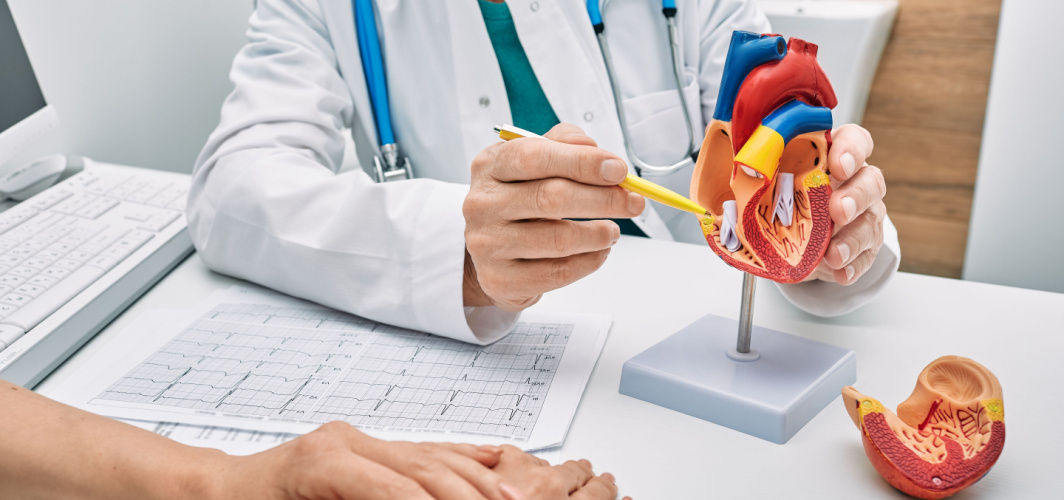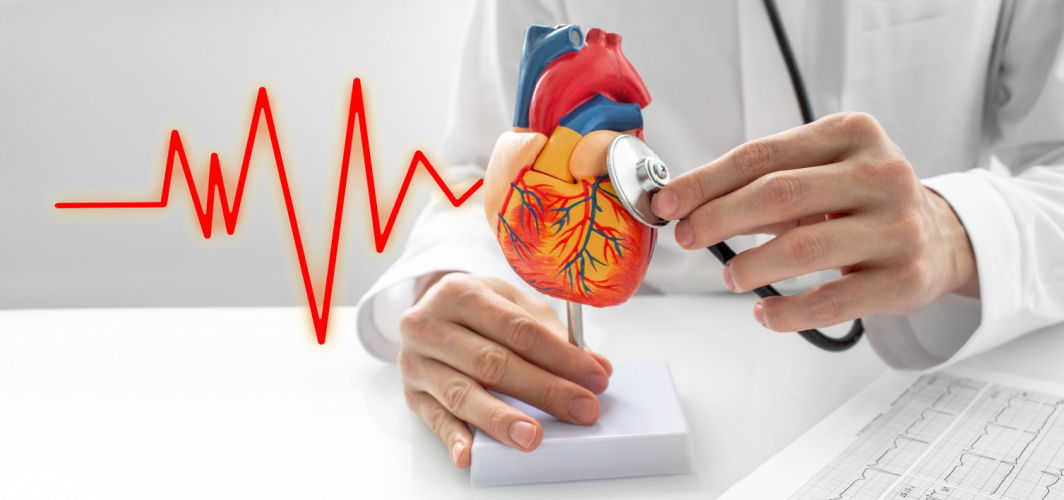Heart Conditions
Heart Health: Separating the Myths from Facts
5 min read
By Apollo 24/7, Published on - 24 March 2021, Updated on - 28 January 2024
Share this article
0
25 likes

According to the World Health Organization (WHO), cardiovascular diseases are the leading cause of death globally, resulting in 17.9 million deaths every year. It is extremely important to keep the heart in great shape, as heart diseases can affect a person of any age. However, there are several misconceptions and myths associated with heart health and associated diseases. It is necessary to separate the myths from the facts to be able to follow a heart-healthy lifestyle.
Myth 1: Fats are bad for the heart.
Fact: Not all fats are created equal and therefore they affect the heart in different ways. Unsaturated fats (both monounsaturated and polyunsaturated) found in fatty fish, olive oil, peanuts, and avocados have omega-3 and omega-6 fatty acids in them, which help in reducing triglycerides (a type of fat in the blood). On the other hand, artificially made trans fats, found in many baked and processed foods, increase the levels of bad cholesterol (LDL cholesterol) in the body. Similarly, saturated fats, found in butter and red meat, are also considered unhealthy for the heart.
Myth 2: If a person is taking cholesterol-lowering drugs, statins, they can eat fatty foods.
Fact: Statins are medicines used to lower the amount of cholesterol formed by the liver. However, it does not reduce the amount of cholesterol gained by the person from fat-rich foods. Continuous intake of fatty foods along with statins reduces the effectiveness of the drug. Studies have shown that the use of statins along with diet control and regular exercising can reduce the risk of cardiovascular diseases by about 25 to 35%.
Myth 3: People with heart disease should avoid exercising.
Fact: Research has shown that people who exercise regularly after surviving a heart attack live longer than those who do not. People who have been diagnosed with heart disease must exercise regularly to avoid the formation of blood clots in the legs and to improve the flow of blood. As per the American Heart Association, people should engage in moderate-intensity exercises such as swimming, brisk walking or cycling regularly for at least two and a half hours every week to maintain overall cardiovascular health.
Myth 4: Quitting smoking does not benefit the heart if the person has smoked for years.
Fact: According to the WHO, the benefit of quitting smoking starts within 20 minutes of quitting, irrespective of the age or the time for which the person has smoked. It further states that after one year of quitting smoking, the risk of coronary heart disease reduces to half, while in 15 years, the risk is equivalent to that of a non-smoker.
Myth 5: Women are less likely to suffer from heart diseases.
Fact: As per the Harvard Medical School, heart disease is the leading cause of death in women. It has been found that men develop coronary artery disease and experience heart attacks at a younger age than women. However, the risk of developing heart diseases increases in women after menopause due to the lack of oestrogen (a hormone). Oestrogen helps in preserving the flexibility of the blood vessels, thus maintaining the blood flow to the heart.
Myth 6: Once heart surgery is done, the problem gets resolved.
Fact: People often undergo surgical treatments such as angioplasty or coronary artery bypass surgery to remove the blockage from the blood vessel and restore blood flow to the heart. However, this does not resolve the underlying problem, which is the fatty deposition that blocks the blood vessels (atherosclerosis). To deal with atherosclerosis, the person would have to improve their eating habits, exercise regularly, lose weight (in the case of obese and overweight people) and quit smoking or else the blood vessels can get clogged with the fatty plaque again.
Myth 7: Heart diseases occur in those who have a family history.
Fact: People with a family history of high blood pressure, diabetes and high cholesterol need to follow a heart-healthy lifestyle as they may be at a higher risk of developing these risk factors. However, various studies have concluded that the majority of heart diseases occur due to poor lifestyle choices, which include an unhealthy diet, smoking and no physical activity. These unhealthy life choices can increase the level of bad cholesterol and blood pressure, ultimately leading to heart disease.
Myth 8: High blood pressure is always accompanied by clear symptoms.
Fact: High blood pressure can damage the blood vessels of the heart by reducing their elasticity, which results in reduced blood flow and oxygen to the heart. This can not only result in a heart attack but other serious health problems such as stroke and kidney damage. As per the American Heart Association, high blood pressure is often called the ‘silent killer’ as sometimes it may not exhibit any symptoms. Thus, the affected person never realises the problem until it causes damage. People suffering from hypertension must get their blood pressure checked frequently.
Myth 9: The typical sign of a heart attack is chest pain.
Fact: It is not necessary to always have chest pain when having a heart attack. A person experiencing a heart attack may have shortness of breath, nausea, pain in one or both the arms, jaw, neck or back, lightheadedness, and heartburn. Some people may also experience pain in their legs, indicating peripheral artery disease (PAD), a condition in which the arteries in the legs get blocked due to plaque buildup. PAD increases the risk of heart attack or stroke, and therefore any such problem must be reported to the doctor immediately.
Takeaway
Doctors believe the number of deaths from coronary artery disease would reduce significantly if more people would follow a balanced diet, exercise regularly for at least half an hour, quit smoking and if required, take medications to lower their risk for heart attacks. Whenever in doubt about matters related to the heart, a cardiologist must be consulted without delay.
Heart Conditions
Consult Top Cardiologists
View AllDr. Anand Ravi
Leave Comment
Recommended for you

Heart Conditions
7 Signs You Need To Visit A Cardiologist
Don’t know whether or not you should see a cardiologist? Well, keeping an eye out for certain signs of heart problems is the best way of maintaining good cardiac health.

Heart Conditions
ECG vs Echo: Know the Difference Between Electrocardiogram vs Echocardiogram
Electrocardiogram (ECG) and echocardiogram (Echo) tests are non-invasive diagnostic procedures that aid in diagnosing and managing various cardiac conditions for improved overall heart health. While they sound similar, there are many major differences between the two tests. Read on to explore the distinctions between an ECG and an echo test.

Heart Conditions
What Is 2D EchoTest: Know Uses, Test Results, How To Read It
The 2D echo test is a noninvasive diagnostic procedure that helps in examining the structure and function of the heart. By providing valuable insights into heart health, this test aids in the detection and monitoring of various cardiac conditions, enabling timely intervention and treatment.
Subscribe
Sign up for our free Health Library Daily Newsletter
Get doctor-approved health tips, news, and more.
Visual Stories

7 Tips to Manage Hypertension
Tap to continue exploring
Recommended for you

Heart Conditions
7 Signs You Need To Visit A Cardiologist
Don’t know whether or not you should see a cardiologist? Well, keeping an eye out for certain signs of heart problems is the best way of maintaining good cardiac health.

Heart Conditions
ECG vs Echo: Know the Difference Between Electrocardiogram vs Echocardiogram
Electrocardiogram (ECG) and echocardiogram (Echo) tests are non-invasive diagnostic procedures that aid in diagnosing and managing various cardiac conditions for improved overall heart health. While they sound similar, there are many major differences between the two tests. Read on to explore the distinctions between an ECG and an echo test.

Heart Conditions
What Is 2D EchoTest: Know Uses, Test Results, How To Read It
The 2D echo test is a noninvasive diagnostic procedure that helps in examining the structure and function of the heart. By providing valuable insights into heart health, this test aids in the detection and monitoring of various cardiac conditions, enabling timely intervention and treatment.



